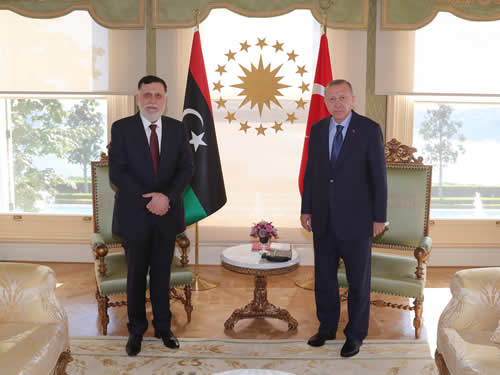The surprise resignation of the Libyan prime minister last year was due to Turkish President Recep Tayyip Erdoğan’s persistent demands for Turkish businessmen close to him, a former ally of Erdoğan claimed on Sunday.
Sedat Peker, a convicted gang leader who was released in 2014 following the passage of legislation that limited the length of pre-trial detention to five years, claimed that Fayez al-Sarraj, the former prime minister of Libya’s UN-recognized Government of National Accord (GNA), resigned after he was caught in the middle between Erdoğan’s demands and those of Libyan businessmen who had supported him during the country’s turbulent civil war.
“I met a Turkish minister whom I will not name. He told me our president had asked [Sarraj] to award these tenders to these [Turkish] companies. The man then resigned. Everybody asked why. I only learned the reason after this minister told me. The man [Sarraj] resigned after his financial supporters asked what they were to do [if all these tenders were awarded to Turkey],” said Peker in his eighth Youtube video, which has been viewed by 11 million people in the one day since it was posted.
International observers had speculated that Sarraj was facing pressure from both demonstrators and members of his own camp, notably then-Interior Minister Fathi Bashagha, who was often described as Ankara’s man in Libya.
The Turkish reaction to Sarraj’s resignation seemed to confirm the disagreement between the two leaders. Despite the fact that Erdoğan said that “a development like this, hearing such news, is upsetting,” presidential spokesperson İbrahim Kalın a few days later said Sarraj had earlier told Turkey that he might opt for such a move. “Agreements between Turkey and Libya will not be affected by the resignation given the fact that they are the decisions of the government, not the decisions of one individual,” Kalın added. He in particular sent a clear message, stating that “… the Government of National Accord is already eager to cooperate with Turkish companies in infrastructure investment, hospital construction, health and transportation and in other sectors such as energy.”
Sarraj later took back his decision to resign in October 2020 and remained in office until there had been a vote of confidence for a new interim government in March 2021.
Turkey played a significant role in the military success of the UN-backed GNA against the rebel opposition led by Khalifa Haftar, a retired general who was trying to seize power in Libya. Turkey sent not only weapons, ammunition and drones but also organized Syrian mercenaries and jihadists to fight against Haftar. Moreover, on January 2, 2020, Turkey’s parliament authorized the Turkish government to send military forces to Libya following a security cooperation deal.
Haftar’s goal of seizing Tripoli abruptly ended after Turkey intervened with its supply of multi-purpose Bayraktar TB2 drones, which were manufactured by Turkish company Baykar Makina. Baykar is led by Erdoğan son-in-law Selçuk Bayraktar.
It is no secret that in addition to supporting the government, which is ideologically close to him, Erdoğan repeatedly said Libya’s oil and gas resources were important factors in Turkey’s interest in the country. Speaking at a joint news conference with al-Sarraj in Ankara on June 4, 2020, Erdoğan revealed his plan for Libya’s oil reserves. “We aim to expand our cooperation including exploration and drilling operations to take advantage of natural resources in Libyan territory,” he said.
Turkey and the GNA in November 2020 signed a military cooperation pact along with a maritime demarcation deal. The maritime agreement, which is not recognized by any Mediterranean country, determines the Turkey-Libya continental shelf and exclusive economic zone (EEZ), while the security deal allows the Turkish government to deploy its troops in Libya.
Most recently Rönesans Holding, the Turkish company owned by an Erdoğan ally that built his presidential palace, signed several lucrative agreements with Libya to build a new terminal at Tripoli International Airport, three power plants and a shopping mall after Erdoğan met with interim prime minister Abdul Hamid Dbeibah in Ankara on April 13. It was also announced that Turkey’s Aksa Enerji also signed a power plant construction deal with its Libyan counterpart, GECOL.
By: Levent Kenez
Source: Nordic Monitor



